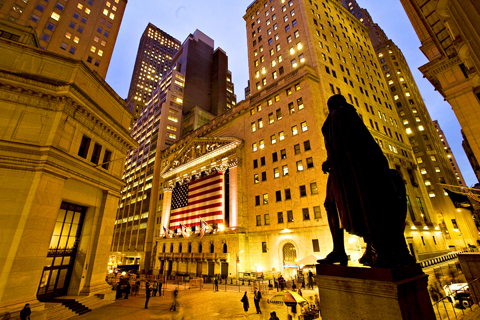The US Federal Reserve on Wednesday expressed growing confidence that an economic recovery was building, even as it stuck to its commitment to keep borrowing costs near zero for “an extended period.”
As expected, the central bank closed out a two-day meeting with a decision to keep benchmark overnight interest rates in a range of zero to 0.25 percent. The vote was unanimous.
In a statement, the Fed said the US economy had “continued to pick up” since its last meeting in September, but it expressed concern the recovery was likely to be muted.

PHOTO: BLOOMBERG
“Household spending appears to be expanding but remains constrained by ongoing job losses, sluggish income growth, lower housing wealth and tight credit,” it said.
While still emphasizing risks, the Fed was a bit more upbeat than in September, when it had simply said spending was “stabilizing.”
The Fed cut interest rates to near zero last December and has pumped more than US$1 trillion into the economy to tame a severe financial crisis and the deepest recession since the 1930s.
The US central bank was more explicit than it had been previously on why it expects to be able to keep rates “exceptionally low” for a long time, citing the slack that has built up in the economy and the lack of an inflationary threat.
By citing “low rates of resource utilization, subdued inflation trends and stable inflation expectations,” analysts said the Fed was providing a road map to follow to determine when it may finally begin to tighten policy.
“If there is any surprise, it sounds like there is not even any hint that they are going to raise rates soon,” said Robert MacIntosh, chief economist at Eaton Vance Corp in Boston. “We’ve got a number of Fed meetings to go before we will get any kind of increase.”
Most analysts at top US banks have been expecting the Fed to keep interest rates on hold until the middle of next year or later. Before it raises rates, it is expected to begin to withdraw some of the cash it pumped into the economy to keep credit flowing.
Other central banks also are wrestling with how best to spur economic growth and when to withdraw extraordinary measures to support their economies.
The European Central Bank was expected to keep rates on hold at a record-low 1 percent yesterday, while there was a good chance the Bank of England would expand its large asset purchase program at a meeting the same day.

The Central Weather Administration (CWA) yesterday said it expected to issue a sea warning for Typhoon Fung-Wong tomorrow, which it said would possibly make landfall near central Taiwan. As of 2am yesterday, Fung-Wong was about 1,760km southeast of Oluanpi (鵝鑾鼻), Taiwan’s southernmost point, moving west-northwest at 26kph. It is forecast to reach Luzon in the northern Philippines by tomorrow, the CWA said. After entering the South China Sea, Typhoon Fung-Wong is likely to turn northward toward Taiwan, CWA forecaster Chang Chun-yao (張峻堯) said, adding that it would likely make landfall near central Taiwan. The CWA expects to issue a land

The Central Weather Administration (CWA) yesterday said it is expected to issue a sea warning for Typhoon Fung-wong this afternoon and a land warning tomorrow. As of 1pm, the storm was about 1,070km southeast of Oluanpi (鵝鑾鼻), Taiwan’s southernmost point, and was moving west-northwest at 28 to 32kph, according to CWA data. The storm had a radius of 250km, with maximum sustained winds of 173kph and gusts reaching 209kph, the CWA added. The storm is forecast to pass near Luzon in the Philippines before entering the South China Sea and potentially turning northward toward Taiwan, the CWA said. CWA forecaster Chang Chun-yao (張峻堯) said

PREPARATION: Ferry lines and flights were canceled ahead of only the second storm to hit the nation in November, while many areas canceled classes and work Authorities yesterday evacuated more than 3,000 people ahead of approaching Tropical Storm Fung-wong, which is expected to make landfall between Kaohsiung and Pingtung County this evening. Fung-wong was yesterday morning downgraded from a typhoon to a tropical storm as it approached the nation’s southwest coast, the Central Weather Administration (CWA) said, as it issued a land alert for the storm. The alert applies to residents in Tainan, Kaohsiung, Pingtung and Taitung counties, and the Hengchun Peninsula (恆春). As of press time last night, Taichung, Tainan, Kaohsiung, and Yilan, Miaoli, Changhua, Yunlin, Pingtung and Penghu counties, as well as Chiayi city and county had

The Central Weather Administration (CWA) yesterday issued a sea alert for Typhoon Fung-wong (鳳凰) as it threatened vessels operating in waters off the Pratas Islands (Dongsha Islands, 東沙群島), the Bashi Channel and south of the Taiwan Strait. A land alert is expected to be announced some time between late last night and early this morning, the CWA said. As of press time last night, Taoyuan, as well as Yilan, Hualien and Penghu counties had declared today a typhoon day, canceling work and classes. Except for a few select districts in Taipei and New Taipei City, all other areas and city